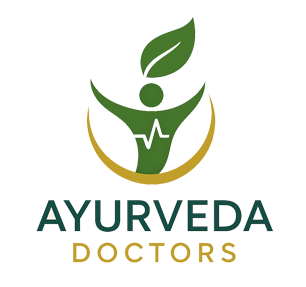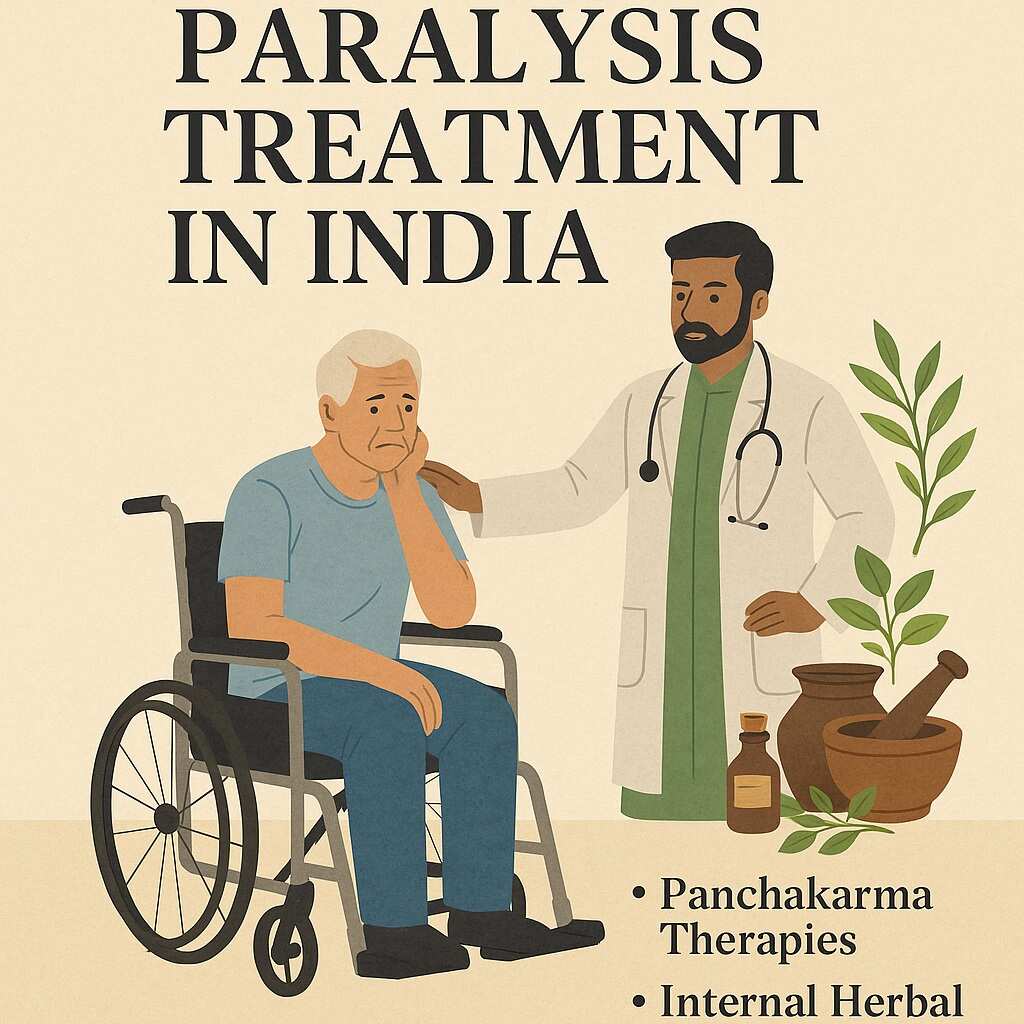Paralysis – whether caused by a stroke, nerve damage, or trauma – can bring life to a sudden halt. It affects movement, independence, and confidence. But in India, where the roots of Ayurveda run deep, there’s a growing wave of recovery stories through Ayurvedic paralysis treatment. Unlike modern medicine that focuses on symptoms, Ayurveda works to revive the nervous system naturally by balancing the body, mind, and vital energies.
🧠 What is Paralysis According to Ayurveda?
In Ayurveda, paralysis is known as Pakshaghata, a disorder linked to the imbalance of Vata dosha — the principle that governs movement, nerve signals, and muscular activity. When Vata becomes aggravated due to stress, trauma, poor digestion, or toxins, it can lead to the disruption of neural communication, resulting in partial or complete loss of motor functions.
🌱 Ayurvedic Approach to Treat Paralysis
Ayurveda uses a multi-dimensional treatment strategy to treat paralysis by focusing on detox, nerve rejuvenation, mental balance, and physical strengthening.
✅ Panchakarma Therapies:
-
Abhyanga (Warm oil massage) – Stimulates nerves and improves circulation
-
Swedana (Herbal steam therapy) – Removes stiffness and toxins
-
Basti (Medicated enemas) – Core Vata balancing therapy
-
Nasya (Nasal drops) – Clears channels in the head and improves brain functions
-
Shirodhara – Promotes calmness and neurological stability
✅ Internal Herbal Medicines:
-
Ashwagandha – Nerve strengthening & anti-inflammatory
-
Rasna, Bala, Dashamoola – Improve circulation and reduce stiffness
-
Brahmi, Shankhpushpi – Enhance brain function and mental clarity
✅ Yoga & Diet Therapy:
-
Yoga asanas like Bhujangasana, Tadasana, and gentle stretches help improve muscle control
-
Anti-Vata diet: Warm, nourishing, easy-to-digest foods
-
Lifestyle recommendations: Daily routine, oil application, stress-free living
🏥 Top 10 Places for Ayurvedic Paralysis Treatment in India
1. Sai Ayush Ayurveda Hospital – Hyderabad, Telangana
📍 KPHB & Madeenaguda
🔗 Website
A trusted center for neurotherapy, stroke rehabilitation, and Vata-balancing Panchakarma. Offers inpatient care, physiotherapy integration, and insurance support.
2. Kottakkal Arya Vaidya Sala – Kerala
📍 Malappuram, Kerala
🔗 Website
Over 100 years of legacy in treating Pakshaghata using classical therapies. Highly recommended for chronic nerve disorders and post-stroke recovery.
3. SDM Ayurveda Hospital – Udupi, Karnataka
📍 Udupi, Karnataka
🔗 Website
Specializes in neurological Ayurvedic care with in-house herbal pharmacy, physiotherapy, and inpatient services backed by academic research.
4. Jiva Ayurveda – Pan India (Online + Clinics)
📍 Available in 80+ cities
🔗 Website
Offers personalized video consultations with expert doctors and customized herbal medicines shipped to your home. Ideal for long-term paralysis care.
5. AVN Arogya Ayurvedic Hospital – Madurai, Tamil Nadu
📍 Madurai, Tamil Nadu
🔗 Website
Known for treating neuro-muscular conditions with decades of clinical experience and modernized Panchakarma setups.
6. AyurVAID Hospitals – Bangalore, Kochi, & Domlur
📍 Multiple branches in South India
🔗 Website
India’s NABH-accredited chain offering paralysis management with digital tracking, integrated rehab, and chronic care focus.
7. Patanjali Ayurveda Chikitsalay – Haridwar, Uttarakhand
📍 Haridwar, Uttarakhand
🔗 Website
Affordable therapies, natural supplements, and Swami Ramdev-backed expertise in paralysis, stroke, and muscular dystrophy.
8. Kerala Ayurveda Limited – Kochi, Kerala & PAN India
📍 Kochi, Bengaluru, Mumbai
🔗 Website
A pioneer in classical Ayurveda + global wellness, providing effective herbal remedies and therapy plans for neuro-degeneration.
9. Sri Sri Ayurveda Hospital – Bengaluru, Karnataka
📍 Kanakapura Road, Bengaluru
🔗 Website
Combines Ayurveda, yoga, and mind-body healing. Offers Panchakarma + meditation for holistic paralysis treatment.
10. Ayushakti Ayurved – Mumbai, Maharashtra
📍 Mumbai, India & International Clinics
🔗 Website
Offers Marma therapy, herbal detox, and pulse diagnosis for treating stroke-related conditions naturally.
🔍 Who Can Benefit from Ayurvedic Paralysis Treatment?
-
Patients with stroke/hemiplegia
-
Facial paralysis/Bell’s palsy
-
Spinal cord injuries
-
Parkinson’s or multiple sclerosis
-
Paraplegia/quadriplegia
-
Post-surgical nerve damage
Top 10 FAQs on Ayurvedic Paralysis Treatment
Q: What is the best Ayurvedic treatment for paralysis in India?
The best Ayurvedic treatment for paralysis includes a combination of Panchakarma therapies, such as Abhyanga (medicated oil massage), Basti (Vata balancing enema), Nasya (nasal detox), and Shirodhara (mind-calming oil therapy). These therapies help rejuvenate nerves, improve blood flow, and restore muscle coordination. Centers like Sai Ayush Ayurveda Hospital and Arya Vaidya Sala, Kerala are renowned for such integrative care.
Q: Can Ayurveda cure paralysis completely?
Ayurveda focuses on restoring functionality, improving quality of life, and minimizing long-term dependency. While a complete cure depends on the type and severity of paralysis, many patients experience significant improvement in movement, speech, and energy through Ayurvedic treatment — especially when started early and followed consistently.
Q: How does Panchakarma help in stroke recovery?
Panchakarma is a detoxification and rejuvenation process that balances the aggravated Vata dosha, which is often responsible for stroke-related paralysis. Therapies like Basti, Abhyanga, and Pizhichil cleanse toxins, nourish nerves, and enhance neuromuscular coordination. It supports recovery by activating the body’s self-healing mechanisms.
Q: What herbs are used in Ayurvedic paralysis treatment?
Commonly used herbs in Ayurvedic paralysis care include:
-
Ashwagandha – Nerve strength and stress relief
-
Bala – Muscle tone and joint mobility
-
Rasna & Dashamoola – Anti-inflammatory, pain-relief
-
Brahmi & Shankhpushpi – Brain function and memory support
These herbs are typically administered in oils, decoctions, or churnas based on the patient’s condition.
Q: How long does Ayurvedic paralysis treatment take?
Treatment duration varies based on the severity and type of paralysis. Most patients undergo 21 to 90 days of therapy, which may include inpatient Panchakarma, followed by at-home medications, diet, and exercises. Chronic or long-standing paralysis cases may require repeated sessions over several months.
Q: Is Ayurvedic treatment for paralysis effective?
Yes, when administered correctly and under the guidance of certified Ayurvedic doctors, it can be highly effective. Ayurveda doesn’t offer instant results but aims for gradual and sustained improvement through holistic healing, which often surpasses symptom-based treatment approaches.
Q: What are the side effects of Ayurvedic therapy for paralysis?
Ayurvedic therapies are generally safe when performed by trained professionals. Mild side effects like fatigue or soreness may occur initially as the body adjusts to detox and stimulation. However, serious side effects are rare, especially when using high-quality herbs and protocols.
Q: How does Ayurveda treat nerve damage or hemiplegia?
Ayurveda treats nerve damage (and conditions like hemiplegia) by correcting the Vata imbalance. Panchakarma detox, herbal nervine tonics, oil-based massages, and Rasayana (rejuvenation) therapies are used to regenerate nerve tissues, boost circulation, and restore movement gradually.
Q: Can Ayurveda treat facial paralysis (Bell’s palsy)?
Yes, Ayurvedic treatment is highly effective for Bell’s palsy. Localized therapies like Nasya, Ksheera dhara (milk decoction over the face), and facial Marma therapy help reduce nerve inflammation, support nerve regeneration, and bring back muscle coordination naturally.
Q: Is Ayurvedic paralysis treatment better than physiotherapy?
Both have their place. Ayurvedic treatment addresses internal imbalances, nerve nourishment, and detox, while physiotherapy focuses on muscle strength and mobility. When combined, they offer faster and more holistic recovery. Many Ayurvedic hospitals integrate physiotherapy for best results.


0 Comments